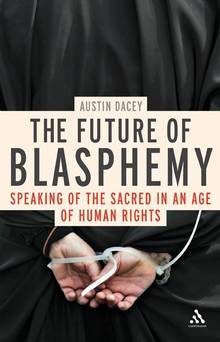The Future of Blasphemy: Speaking of the Sacred in an Age of Human Rights

The Future of Blasphemy: Speaking of the Sacred in an Age of Human Rights
Austin Dacey
Continuum 2012
In the days of Moses, blasphemy was the mortal offence of failing to respect the divine. In an age of human rights, blasphemy is understood as a failure to respect persons, as insult, defamation, or “advocacy of religious hatred.” The criminalisation of this personal blasphemy has been advanced at the United Nations and upheld by the European Court of Human Rights, which has asserted a universal “right to respect for religious feelings.”
The Future of Blasphemy turns respect on its head. Respect demands that we grant each other equal standing in the moral community, not that we never offend. Politically, respect for citizens requires a public discourse that is open to all viewpoints. Going beyond the question of free speech versus religion, The Future of Blasphemy defends an ethical model of blasphemy. Controversies surrounding sacrilege are contests over what counts as sacred, disagreements about what has central, inviolable, and incommensurable value. In such public contestation of the sacred, each of us—secular and religious alike—has equal right to speak on its behalf.
Austin Dacey, Austin Dacey is a Representative to the United Nations, International Humanist and Ethical Union, and Instructor of Humanities at Polytechnic Institute of New York University, USA. He is a philosopher and author of The Secular Conscience: Why belief belongs in public life. His writings have appeared in The New York Times, USA Today, Dissent and Trouw (Netherlands).